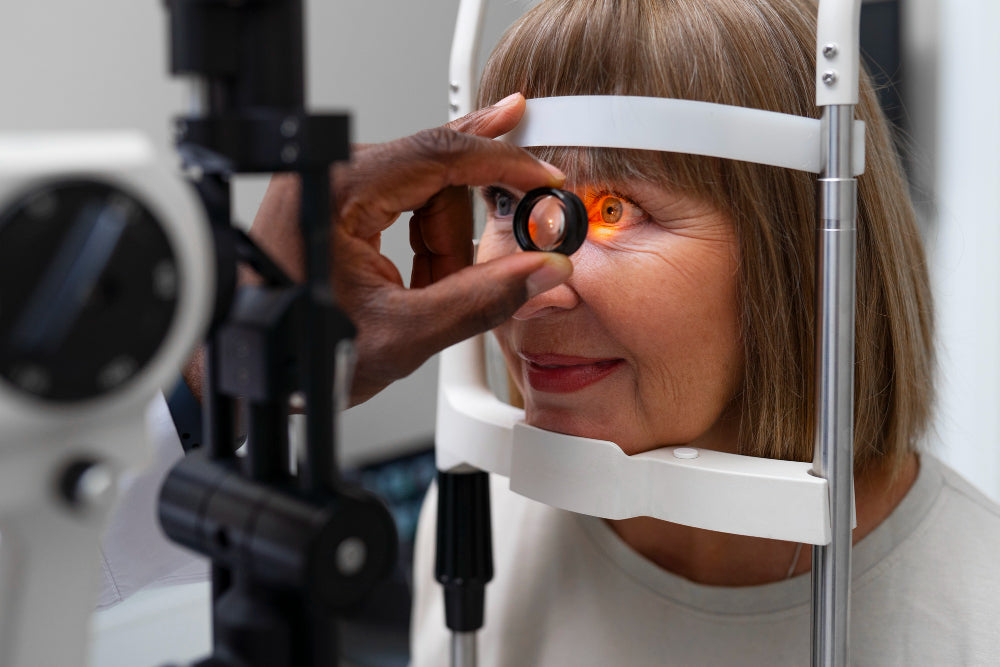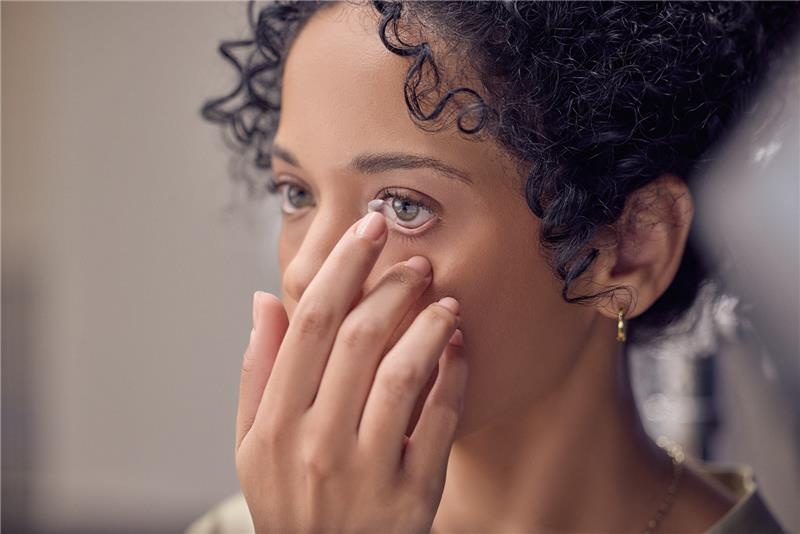When was the last time you had your eyes checked? Do you know the difference between a routine eye exam and a comprehensive eye exam?
A routine eye exam mainly checks your vision and updates your prescription, while a comprehensive eye exam thoroughly evaluates your overall eye health, helping to detect sight-threatening conditions early on.
In this blog post, we'll explore the key differences between routine and comprehensive eye exams. You'll learn which type of exam is right for you and why regular eye check-ups are essential for maintaining optimal vision and health.
Routine Eye Exam
A routine eye exam primarily evaluates your vision and determines if you need corrective lenses. This is the type of exam one mainly receives from commercial locations. Here are some key features:
- Visual Acuity Test: Measures how clear your vision is, and what you can see at various distances.
- Refraction: Determines your prescription for eyeglasses and serves as a starting point for a contact lens prescription. A refraction alone is not enough information to provide a contact lens prescription. Additional measurements must be taken.
- Basic Health Check: Includes a brief eye health check to screen for common issues like glaucoma and cataracts.
Routine eye exams are just a starting point. There is not enough information gathered to thoroughly assess the health of your eyes and the way your eyes work together. Even if you have 20/20 vision that does not mean it is clear, comfortable, or sustainable. An annual comprehensive eye exam is required to help ensure that your vision remains clear, comfortable and healthy throughout your lifetime.
Comprehensive Eye Exam
A comprehensive eye exam includes the elements of a routine exam but goes much deeper into assessing the overall health of your eyes and visual system. Here's what you can expect:
- Thorough Health Evaluation: This includes in-depth tests to check both internal and external structures of your eyes, such as the retina, optic nerve, cornea and blood vessels.
- Dilated Eye Exam??? Sometimes yes and sometimes no: Using special eye drops to relax open the pupils allows the optometric physician to get a better view of the inside of your eye. In the case of young children, dilation also relaxes the focusing mechanism of the eye to provide a more accurate prescription. Dilation is best for people over the age of 60, children 10 and under, people with high prescriptions, people with a history of retinal conditions, people experiencing flashes and floaters, and people with diabetes. In all other cases Optomap 270 degree wide field retinal imaging replaces dilation. All patients who are dilated should also receive Optomap retinal imaging to assist the doctor in achieving a better view of the retina.
- Specialized Tests May be Ordered as a Result of a Comprehensive Eye Exam: These might include visual field testing, optical coherence tomography (OCT), additional dry eye testing, specialty contact lens testing, anterior segment imaging, among many others to further assist in diagnosis and medical management of various eye conditions.
A comprehensive eye exam is advised for everyone, but particularly those with a higher risk of eye diseases, such as people with diabetes, people over the age of 60, or those with a family history of eye conditions.
Routine Eye Exam vs. Comprehensive Eye Exam: Which One Do You Need?

You might be wondering, "Are all eye exams the same?" The short answer is no. The type of exam you need depends on various factors, including your age, health history, and whether you're experiencing any vision problems.
When to Choose a Routine Eye Exam
- You Just Need a Prescription Update and you have had a comprehensive medical eye exam within the last calendar year.
When to Opt for a Comprehensive Eye Exam
It is recommended that everyone have a comprehensive eye exam annually. It is extremely difficult to maintain normal single healthy clear binocular vision from year to year without a comprehensive annual eye exam. It’s risky for your vision to opt for routine exam only. It is extremely important to have a comprehensive eye exam when
- You're Over 40: The risk of developing eye conditions like glaucoma, macular degeneration and cataracts increases as you age. A comprehensive eye exam can help catch these conditions early.
- If You Have Health Issues: A comprehensive eye exam is critical for monitoring your eye health if you have diabetes, high blood pressure, a high prescription, or a family history of eye disease.
- You're Experiencing Symptoms: If you're noticing changes in your vision, such as blurriness, flashes of light, floaters, eye pain or double vision, a comprehensive eye exam can help identify the underlying cause.
Why Are Both Exams Important?

Both routine and comprehensive eye exams play vital roles in maintaining your eye health. Routine exams ensure that your vision is appropriately corrected, while comprehensive exams help in the early detection and management of eye diseases.
Statistics highlight the importance of these exams:
- Glaucoma: Often rightfully called the "silent thief of sight" glaucoma damages the eyes and leads to vision loss without noticeable symptoms. Regular comprehensive exams can catch it early.
- Diabetic Retinopathy: About 90% of diabetes-related blindness is preventable with early detection and treatment.
- Macular Degeneration: Early diagnosis through comprehensive exams can significantly slow the progression of this condition.
Why Choose a Comprehensive Eye Exam?
Choosing a comprehensive eye exam over a routine eye exam can have several benefits:
- Early Detection of Eye Problems: Comprehensive eye exams can detect eye problems early when they are easier to treat.
- Better Eye Health: Comprehensive eye exams can help identify potential eye problems before they cause significant vision loss.
- Personalized Care: Comprehensive eye exams allow your eye doctor to tailor your care to your specific needs and eye health.
- Increased Confidence: Knowing that your eye doctor thoroughly examines your eyes can increase your confidence in your eye health.
- Better Eye Comfort: Remember, even if you have 20/20 vision, that doesn’t mean it’s comfortable or sustainable throughout your busy day, particularly with the added strain computers and digital devices place on our eyes. More measurements are taken to assess the way your eyes work together to enhance your visual function in all circumstances.
Conclusion

Understanding the differences between routine eye exams and comprehensive eye exams can help you make informed decisions about your eye care.
Both types of exams have their place, but they serve different purposes. Routine eye exams ensure your vision remains clear today. Comprehensive eye exams thoroughly assess your overall eye health, helping to detect and treat potential problems early… thus helping you maintain clear comfortable vision over a lifetime.
Schedule your appointment today to determine which exam is right for you. Taking proactive steps toward your eye health can help preserve your vision for years to come.
Ready to see the world through a clearer lens? Dive into our insightful blogs at Vision Source Rio and discover a wealth of knowledge to enhance your vision health journey. Explore now to take the first step toward brighter, sharper eyesight!
Explore Further:





